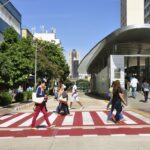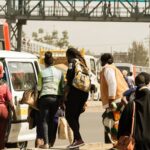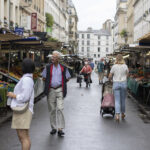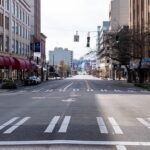Posts tagged with 'cycling infrastructure'
Rafaela Aires’s workday starts at 9:00 a.m., leading her down city streets that weave past the Atlantic shoreline and under concrete overpasses. Her collected bottles and cardboard boxes used to form heaps in a hand-drawn cart. Now, they rattle in ...

Mexico became the first nation to declare access to safe mobility a human right in 2020 and two years later passed the General Law of Mobility and Road Safety to protect people, reduce collisions and promote sustainable modes of travel. Now, with this new ...

Since the mid-2010s, cities around the globe have witnessed the explosion of free-floating electric bikes, mopeds and scooters on their streets. NUMO, the New Urban Mobility alliance, began tracking this phenomenon in 2019 with the New Mobility Atlas. Between 2019 and ...

Urban development in many cities around the world prioritizes making space for cars over pedestrians, cyclists or public transportation. In Brazil, this design led to an average of more than 30,000 annual road crash fatalities nationwide by the turn of the century, ...

For a woman living in an African city, public transport can be a daunting experience. Women usually plan their trips in advance, and consider a multitude of factors before setting out: What is the safest way to reach the bus ...

By David Waskow, Jennifer Layke, Nate Warszawski, Preety Bhandari, Gabrielle Swaby, Natalia Alayza, Jamal Srouji, Mario Julien Díaz, Edward Davey, Rogier van den Berg, Roman Czebiniak, Paige Langer and Nathan Cogswell on December 19, 2023
The COP28 climate talks began with a new fund to address the increasingly severe losses and damage vulnerable countries face from climate impacts and concluded with the first international agreement to tackle climate change’s main driver: fossil fuels. Those bookends to the Dubai summit ...

Getting around any megacity as dense and vast as Cairo, Egypt can be a challenge, even for the most able-bodied, well-traveled and well-informed commuter. The plethora of options for transport modes and routes has made it difficult to decode and ...

Until just a few years ago, the right riverbank of the Seine in Paris was an urban highway used by over 40,000 vehicles every day. Despite being named a UNESCO World Heritage Site, the road was either heavily gridlocked during rush ...

Many governments and authorities started to build cycling infrastructure during the COVID-19 lockdowns. But were these developments temporary or the foundation of a permanent shift towards truly cyclable cities? In this episode of WRI’s “Big Ideas Into Action” podcast, we ...

U.S. President Biden has touted the potential climate benefits of the Bipartisan Infrastructure Law, which makes historic investments in transportation, the country’s largest and fastest-growing source of greenhouse gas emissions. But while the bill’s investments could significantly lower transportation emissions, those reductions are not ...

Metropolitan areas around the world struggle with the same problem: More people means more traffic. If the majority of residents and workers use private vehicles, this leads to more congestion and emissions, more road crashes, lower air quality and therefore ...

As 2021 closes, most cities around the world continue to grapple with the uncertainty of a pandemic now in its second year. Amid dips and rises in cases, the emergence of new variants, and the ongoing challenge of vaccinating the ...

Traditional, car-centric transport planning has not only increased greenhouse gas emissions, but has also detrimentally impacted air quality, road injuries and fatalities, and traffic congestion. As the world faces the climate crisis and continues to face a growing global road ...

COVID-19 changed the way people move around cities. In 2020, demand for travel dropped dramatically, and many urban areas enforced restrictions on movement through lockdowns in a bid to control the impact of the pandemic. These lockdown periods throughout most ...

Since the beginning of the coronavirus pandemic, cycling has become an even more popular, resilient and reliable travel option, and pop-up bike lanes have been increasingly common in major cities around the globe. Between March and July 2020, 394 cities, ...















![Why Cycling Is Critical for Resilient Cities [PODCAST]](https://thecityfix.com/wp-content/uploads/2022/06/14395435439_2b18f2bcb4_c-690-150x150.jpg)







